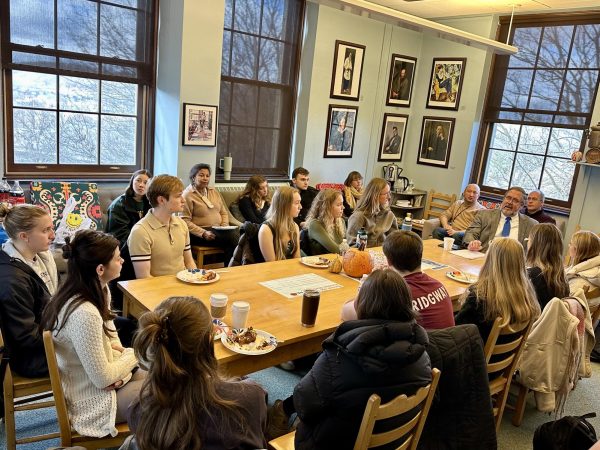Colgate Welcomes Physics Lecturer from the University of Rochester
On Tuesday, January 20, Associate Professor of Physics at the University of Rochester Andrew Jordan visited Colgate to present a Physics and Astronomy seminar to students and faculty.
Dozens of students gathered to hear Professor Jordan discuss “The Quantum Road Most Taken: Continuous Measurements and Superconducting Qubits.” Though Jordan teaches solely at the graduate level, he eagerly came to Colgate for a presentation aimed toward an undergraduate audience.
“Professor Parks told me I should think about talking to undergraduates, which is a little bit unusual for me, but I’m happy to do it. I was telling her, I had a great idea. I recently gave a similar talk to philosophers, and I figured this would be the right level to also explain to you,” Jordan said.
To preface his discussion of quantum physics with a particular focus on quantum trajectories and continuous measurement, Professor Jordan read the poem “The Road Not Taken” by Robert Frost.
“Commentaries about this poem usually focus on the last line, about wistfulness, about taking the road less travelled and so on, but for my purposes I want to do something a little bit different. I want to focus on a different part, the first part of the poem: ‘And sorry I could not travel both / and be one traveler.’ This is the theme of my talk,” Jordan said.
To keep the lecture accessible, Jordan focused only on two-level quantum systems. He also spent a fair amount of time covering foundational material necessary for understanding the basics of quantum physics.
One of the main distinctions Jordan drew was the difference between the observer of the classical world of physics and the observer of the quantum world.
“The observer [of the quantum world] interacts with the outside world in a way that changes it … Active observation begins to impinge on the outside world in such a way that you can’t disentangle anything. Somehow, observation changes reality which in turn changes observation,” Jordan said.
The remainder of the lecture focused on new types of measurements within quantum physics and mechanics. Measurements within quantum physics can be continuous, may be probabilistically reversed and can be minimally disturbing on the state being observed.
This is contrary to traditional textbook definitions of quantum measurements, which requires that each measurement is instantaneous, cannot be reversed and is projective, or extremely disturbing. As the study of quantum physics expands, these traditional properties can be broken, and researchers can delve further into the nuances of the field.
Students were pleased by the intense academic nature of the lecture, as Jordan was limited to only one hour within which to speak broadly about the field of quantum physics.
“The presentation was surprisingly erudite and scientifically dense for a lecture that was supposedly designed to be presented to philosophy majors,” first-year Kara Jaramillo said.





